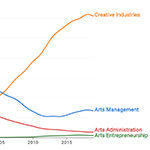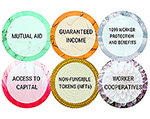As I start a semester-long sabbatical from teaching to think and write, I’m revisiting/repurposing this platform as a field guide for that journey.
Business in service of beauty
This beauty course is not aimed at putting beauty in service of business. My aim is the opposite. I want leaders to put business in service of beauty. Diane Ragsdale (2022) The world lost a brilliant mind and beautiful spirit with the passing of Diane Ragsdale last week. Elsewhere, in time, I will share more […]
Two goals to rule them all
I’ve been reading and thinking a lot about human cognition – about how we make sense and take action. The useful answer describes a combo platter of species-wide sense-making systems and their unique manifestation in each of us…
Strategy and the “standard story”
Any strategy or plan for future action is essentially a story. It describes the present and coming world, the dynamics of the past that invoked them both, and the actions that will propel an organization toward a desired future.
Come work with me!
The Arts Management Program at American University has just posted a full-time contract faculty position for the coming Fall. If you’re interested in joining an amazing learning community in Arts Management, in the global cultural city of Washington, DC, give it a look! And/or pass it along to friends and colleagues who might be a […]
Chasing beauty without losing balance
One of the main takeaways from the classic in-depth case study of Steppenwolf Theater is that “self-sufficiency, sustainability, and success pull in different directions.” This tension is a constant balance and bother for arts managers who want to play the long game.
What’s in a name: Arts Management?
The Google Books Ngram Viewer offers an interesting way to track the popularity of a term over time. The service draws from the scanned contents of tens of millions of books encoded by Google. And it can offer a glimpse at the rise (and fall) of phrases, topics, or subjects over two centuries. A search […]
Six Paths to Support Working Artists
To imagine and explore other opportunities to support working artists and creative projects, Fractured Atlas commissioned an “Opportunity Scan” of six possible paths forward.
What are we planning, exactly, when we plan?
If you and I make a plan to meet for coffee, next Tuesday at 1:00 pm, in a cafe on the second floor of a building downtown, what are we doing exactly? It’s easy to say that “we’re planning to meet for coffee,” but you can’t define a term using the term itself. No fair.
Announcing #ArtsManaged
I’m thrilled to announce the public launch of a new experiment, the #ArtsManaged initiative – a series of digital resources exploring and advancing the practice of Arts Management.











